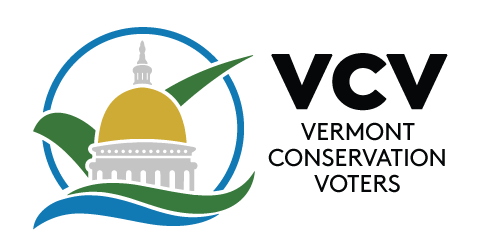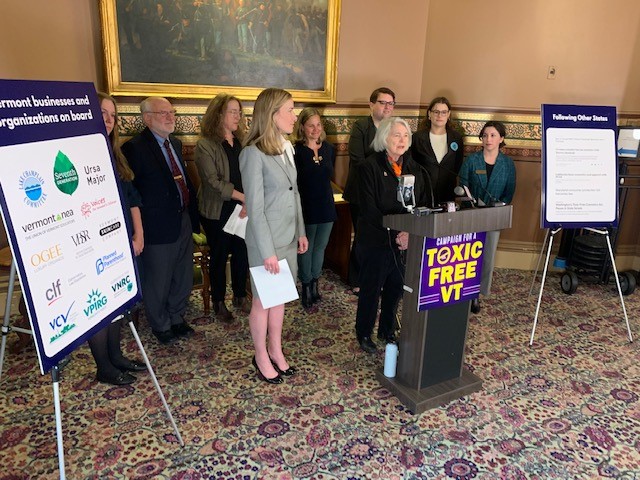Montpelier – Today, Vermont elected officials, local business leaders, and advocates gathered at the State House to call for swift action to advance legislation (S.25) that restricts PFAS and other toxic chemicals from cosmetic and menstrual products, and bans PFAS from textiles and artificial turf athletic fields. The bill passed the Senate unanimously, and has now been sent to the House Committee on Human Services for their consideration.
“Vermonters should not have to wonder if their menstrual or skincare products are harming their bodies,” said Attorney General Charity Clark. “I applaud the Legislature for taking this important step in protecting Vermonters from these harmful chemicals.”
“We will already be dealing with the devastating impacts of PFAS ‘forever chemical’ contamination for generations to come, and the best thing we can do immediately is stop importing more of these chemicals into our state,” said Lauren Hierl, Executive Director of Vermont Conservation Voters. “We thank the Senate for their unanimous support, and look forward to working with the House to move S.25 forward.”
Senator Ginny Lyons, Chair of the Committee on Health & Welfare, added, “Vermont is a leader in protecting people from threats of toxic chemicals.This is significant not only for our work with other states, but also as an example to states that have not yet acted to remove harmful toxic chemicals from consumer products.”
The chemicals banned by this bill – including PFAS, phthalates and formaldehyde – are all linked to numerous negative human health impacts. Recently, the federal Environmental Protection Agency (EPA) issued their first-ever proposal to regulate 6 of the thousands of PFAS chemicals, affirming that virtually no level of these chemicals is safe for drinking water. But much more work needs to be done to understand the extent of PFAS contamination in Vermont’s environment and our bodies, and to protect Vermonters from these harmful chemicals.
S.25 targets four different areas of consumer products that are major sources of exposure and environmental contamination:
- Bans a list of 14 chemicals and chemical classes from personal care products and period products,
- Bans PFAS from all textiles, including apparel, and
- Bans PFAS from artificial turf fields.
“Expecting mothers, young children, and other vulnerable Vermonters are unknowingly exposing themselves to carcinogenic and endocrine-disrupting chemicals every single day through these products,” said Marcie Gallagher, Environmental Advocate with the Vermont Public Interest Research Group. “We know this contributes to health impacts like reproductive harm, neurological disorders, and suppressed immune systems. Every single toxic product we can replace with safer, available alternatives will reduce these risks and protect future generations.”
“Two years ago we passed Act 36, a law protecting Vermonters from PFAS in food packaging, fire fighting foam, rugs and carpets, and ski wax. Shortly after we passed Act 36, I was in the supermarket shopping for shaving cream and read “perfluorodecalin” on an ingredient label. Since I had spent much of my year researching perfluoroalkyl and polyfluoroalkyl substances (PFAS), I knew not to buy it. However, most Vermonters won’t know when basic items like clothing, furniture, or personal care products contain PFAS or other harmful chemicals. People shouldn’t need to worry about carcinogens and endocrine-disruptors when they are shopping, and industries shouldn’t be making profits while exposing Vermonters to toxic chemicals,” said Representative Dane Whitman, member of House Committee on Human Services. “It took rigorous policy work for Act 36 to pass the legislature unanimously, gain the Governor’s signature, and simultaneously lead the nation in addressing PFAS in consumer products. We need to dedicate the same level of effort to S.25, and extend these policies to other industries that pose a serious risk to public health.”
Martin Wolf, Director of Sustainability & Authenticity for Seventh Generation added, “over the last four decades, the nation-wide incidence of childhood leukemia and brain tumors has increased by 35%. The nation-wide incidence of testicular cancer has increased 70% and of non-Hodgkin’s lymphoma by 76%. It is estimated that between 60-90% of these cancers are caused by environmental factors including chemical exposures. I encourage the House to take this step for cancer prevention and the health of the citizens of Vermont.”
From production of the chemicals, to their transport, their use in products, and disposal in our landfills, toxic chemicals pose threats to communities throughout their lifecycle. S.25 is an opportunity for Vermont to build on the work done thus far to regulate toxic chemicals, and protect the health and wellbeing of all Vermonters.
For each of these product categories, there are safer and cost-competitive alternatives available – or the chemicals are not necessary in the first place. This bill aligns us more closely with states like California and Washington, and many retailers are also starting to move away from the use of these toxic substances in the products they sell. This bill will require more companies to restrict these harmful chemicals in these product classes.
Kristi Lafayette with Vermont Skincare Co., a Vermont-based brand selling personal care products, celebrated the Senate’s passage of S.25, “Moving this policy swiftly will help businesses like ours that have already taken it upon themselves to avoid unsafe or questionable ingredients in our products.”

